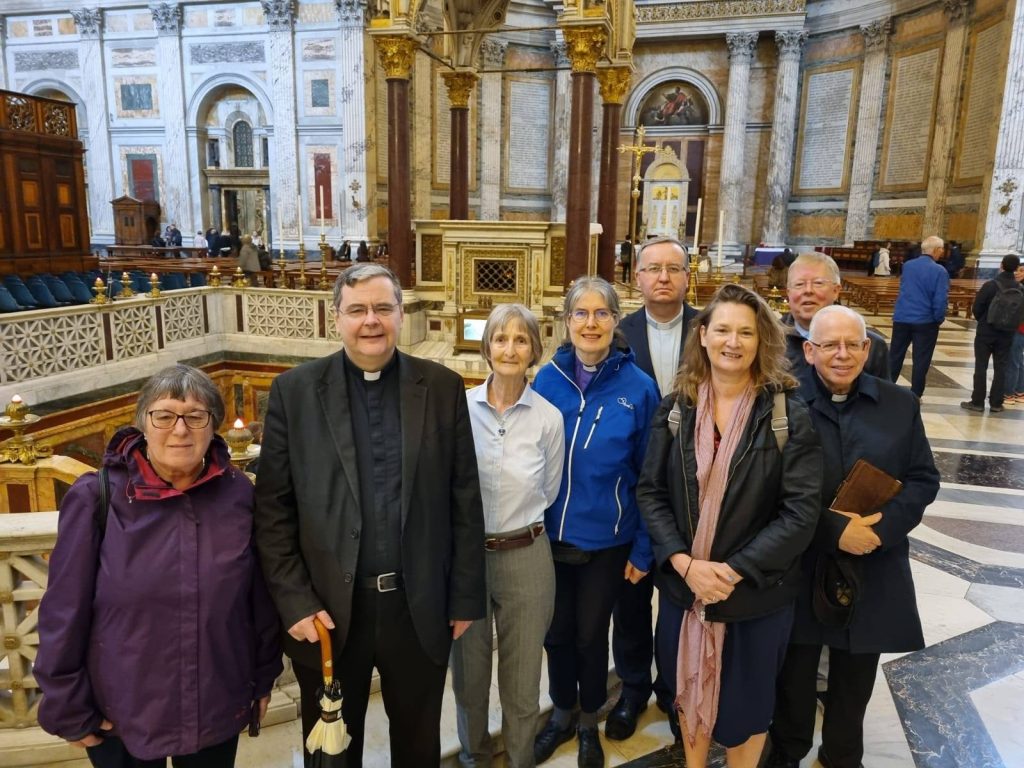Pilgrims journeying together towards hope is the theme of this Jubilee Year in the Catholic Church, marking the anniversary of Christ’s birth. Among other things, there is an invitation to make an actual pilgrimage and Catholics flock to Rome, the city of the great apostles Peter and Paul on which the apostolic foundations of the church were built. At the end of a third term of five years of the official ecumenical dialogue between the United Reformed Church and Roman Catholic Church in Britain, we decided, as a group of pilgrims across two different church traditions, to journey to Rome together.
During the five years of this stage of the dialogue, we have already visited various places around Britain to listen and to learn about ecumenical partnerships. These visits covered the diversity of the ecumenical challenges in different parts of our nation, taking in the historic ecumenical partnership in Milton Keynes, the ‘ecumenical county’ of Cumbria, and the particular relationships between Churches and civic authorities in Scotland and in Wales. It seemed fitting we would now journey to Rome with all its significance for the foundations of Christianity and also the pain of separation. We came as pilgrims journeying together towards hope for future unity.
Shared mission in the local context
Our chief practical aim was to share our final resource document, the fruit of our labours over the last five years. This document draws together in a manageable resource booklet conversation pieces for the use of local congregations in their journeying together. The resource gives a lead to how two congregations from different traditions, even with perhaps quite distinctive beliefs and worship, can come together to pray, to share faith, and especially shared mission in the local context.
The document has already been shared with Churches Together in England, who are promoting it nationally. In Rome, the group presented the resource booklet to the Dicastery for the Promotion of Christian Unity (DPCU), the World Communion of Reformed Churches Office, and the British Embassy to the Holy See. At the DPCU Fr Martin Browne OSB commented: “even though our Churches generally have good relationships nowadays, we often don’t know much about each other and each other’s beliefs, and it is still very easy for us to be strangers to one another. Friendly strangers, but strangers nonetheless. The relationship-building that the group has modelled, and the excellent resources they have produced for local congregations to use together are a wonderful example that could be imitated in many other contexts”.
Rev Tara Culweis, Reformed Churches Officer for relations with the Catholic Church, agreed that this “is a resource that enables conversation for local congregations with their URC or Catholic neighbour. Without a doubt this will lead to congregations focusing on what is possible together rather than being limited by theological differences”.
The resource was also received with interest by Alessandra Trotta, Moderator of the Tavola Valdese, and by the formation staff at the Beda College, a Roman Catholic seminary for older English-speaking men. At the Beda the staff there spoke of the benefit to their students of seeing “delight in ecumenical partners being together”, understanding that good working relationships often start with personal friendship.

Shared enthusiasm for ecumenical encounter
Our own understanding of particular relationships was greatly deepened by hearing from Mediterranean Hope, an NGO formed by ecumenical partners to provide relief, solidarity and practical help to refugees crossing into Italy. Finally, our visit to the Sant’ Egidio Community, an ecumenical institute of apostolic life working with the poor and in international peacebuilding, received us warmly and shared enthusiasm for ecumenical encounter working through mutual passion for solidarity with those most in need in front of us in our respective local contexts.
As we travelled back to our various points of Britain on the long journey across land by rail we had much time to reflect on our experience. Above all our experience of the journey refreshed our hope for the future. It will be a hope which requires renewed commitment to listen and to learn in the spirit of a receptive ecumenism built on a friendship in the Christ we serve together as disciples called to mission.
Roman Catholic/United Reformed dialogue pack (pdf).
Fr Dominic Robinson, SJ, is Vice Chair of the Society for Ecumenical Studies and member of the Department of Dialogue and Unity Catholic Bishops’ Conference of England & Wales, Parish Priest at Farm Street Church, London, Lecturer in Theology at St Mary’s University, and Chair, Justice & Peace Commission, Diocese of Westminster.
People in top photo from L to R: Lindsey Brown, Father Dominic Robinson, Rev Philip Brooks, Rev Sarah Hall, Mary Welsh, Bishop Paul Hendricks, Rev Jason McCullough